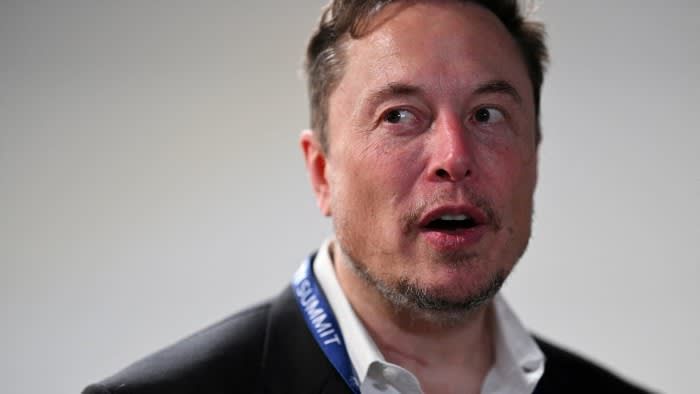Elon Musk’s record $55bn Tesla pay package voided by US judge

Access the Editor’s Digest at no cost.
Each week, Roula Khalaf, the Editor of the FT, chooses some of her top picks and shares them in her newsletter.
A judge in Delaware has voided the $55 billion payment package that Tesla CEO Elon Musk was supposed to receive. The judge concluded that the board of directors didn't properly approve the payment and that it wasn't fair to Tesla shareholders. This decision means that Musk will not be receiving the payment.
On Tuesday, the Delaware Court of Chancery made a decision that caused the price of Tesla stocks to drop by more than 4% during after-hours trading. This setback was particularly frustrating for Musk, who is currently trying to secure several billions of dollars in funding for his fresh artificial intelligence venture.
Kathaleen McCormick, the judge in charge of the Delaware case, has stated that even with just a 22 percent stake in Tesla, Musk used his personality and influence to handle the board. Additionally, the board was not able to prove that the share grant was acquired at a reasonable price and through a fair procedure.
McCormick stated that Musk was the quintessential CEO who possessed superhuman qualities. He also exerted significant influence in the decision-making process that resulted in the approval of his compensation package.
Earlier this month, Musk shared on X platform that he desires to receive an additional grant of Tesla shares. By doing so, he could hold a more significant interest in the company which would, in turn, inspire him to incorporate other emerging projects into the Tesla family.
In simpler terms, if the decision is supported and Musk's salary arrangement is canceled, he will no longer have the opportunity to obtain 303 million Tesla shares, amounting to nearly 10% of the company. This would result in his share decreasing to 13%, which is far from his desired ownership of 25%.
The situation also poses a threat to Musk's standing as the wealthiest individual in the world. Forbes reports that he had a net worth of $251 billion when this year started. Bernard Arnault, who serves as the CEO of LVMH, a luxury goods company, holds the second position with a personal wealth of $201 billion, according to Forbes.
The decision made on Tuesday pertains to a plan made in 2018 where Musk was granted the most substantial remuneration package ever offered to a public company's CEO. The package promised to pay Musk up to $55.8bn upon Tesla hitting specific performance goals.
The ruling from a one-week trial in 2022 stated that the recently given award was significantly larger than the typical pay package received by peers at the same time. It was 250 times higher than the median pay and 33 times larger than Musk's previous compensation plan.
Several individuals who own stocks in Tesla filed a lawsuit claiming that the reward given to Musk was too much and that he had influenced its approval.
Musk was not only the CEO and chair of the company, but he also had strong connections with the directors in charge of bargaining on behalf of Tesla. He was the main influence in the process that resulted in the board's approval of his pay plan. McCormick, in the verdict, stated that for this specific deal, Musk was in control of Tesla.
In 2022, another judge from Delaware affirmed that Musk did not unfairly manipulate the cost of the Tesla-SolarCity merger. These two firms were part of Musk's business ventures, and their union occurred in a stock exchange in 2016. Tesla stakeholders filed a lawsuit, alleging that Musk coerced the deal, referring to it as a SolarCity "bailout," to their disadvantage. Nevertheless, they were not victorious in their case.
McCormick oversaw a legal issue related to Musk's initial plan in 2022 to back out of his $44 billion purchase of Twitter. Just before the trial, Musk gave in and decided to go through with the acquisition using the original agreement, which made him sell off several billion dollars’ worth of Tesla stocks in order to gather enough money.
Musk shared on X that it's not advisable to establish your company in Delaware after the recent verdict. He suggested Nevada or Texas as better choices if you want your shareholders to have a say on company affairs.









































